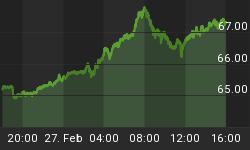This week I spent most of my time in Vancouver, British Columbia, because I was invited to be on Business News Network ("BNN") television, doing the Small Caps segment. Later in the week I did a presentation for subscribers with the Coffin brothers and Lawrence Roulston at the Metropolitan Hotel. Gibson Marketing hosted this event.
What I found interesting about my interview on BNN was the amount of e-mails the producer sent me before I appeared on the show. I was asked to pick five or so companies that I could or would comment upon. There were 75 e-mails from viewers who wanted my opinion on junior resource companies. What was amazing is the fact that I had heard of so few of these companies. Certainly, with more than 4,000 junior resource companies, no one can know them all.
So, after reading all 75 e-mails, I actually felt relieved that I could comment with conviction on a few more than five companies. Taking junior resource companies at random and knowing about 7% in a significant enough way to comment is perhaps acceptable, but it brought to my attention the whole "investing/speculation" genre that surrounds the junior mining sector.
Many of us (and perhaps I am guilty as well) give a false sense of what most of the companies really represent. In many cases these companies are nothing more than a dream, and a good measure of hope is mixed in to keep investors holding their stock. I refer to these types of companies as "story stocks"; each one has a unique "story" -- about how it used to be a mine, or the previous owner did not perform the correct analysis or looked in the wrong place, or was right next to the greatest discovery in the history of mankind. On and on the stories go, and this is quite entertaining at cocktail parties. However, very few are bragging these days about the type of money they are making in these markets.
Last August I was interviewed on Michael Campbell's Money Talks and mentioned to the listeners that not only had the credit crisis begun, but also that some in the junior resource sector were done! In fact, I went out on a limb and said the uranium sector would be especially hard hit. Many companies would not be able to raise more money and subsequently would basically go out of business.
Here it is, a year later, and indeed numerous companies of all sizes are having trouble raising more capital. Further, the prices of many of these companies have retreated to levels that few would have imagined a couple of years ago.
During the BNN interview I ranted a bit, stating that when people buy homes, they purchase the best possible home for their money, and the same thing when shopping for an automobile. But when it comes to stock investing, many people look for the cheapest stocks they can find. This is not the way to invest -- to be successful, you want your money to purchase the very best companies as well. Generally, cheap stocks are cheap for a reason.
There is a paradox here, though, and I did not have time to state it on the TV show. Many junior and senior resource companies are at very attractive levels right now, and astute investors should be carefully selecting bargains at this time. August is historically the best month to buy in to the precious metals, and many of the better-run companies are selling at attractive valuations.
In summary, don't let the summertime blues get you down. Look at the opportunities available, but please, if you are deciding between companies where one sells at $5.00 and one at $0.25, be as certain as humanly possible that the cheaper one truly is superior, not just cheaper.
It is an honor to be,















